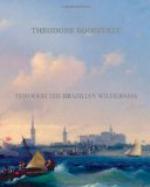We first visited the barracks, saw the troops in the setting-up exercises, and inspected the arms, the artillery, the equipment. There was a German lieutenant with the Paraguayan officers; one of several German officers who are now engaged in helping the Paraguayans with their army. The equipments and arms were in good condition; the enlisted men evidently offered fine material; and the officers were doing hard work. It is worth while for anti-militarists to ponder the fact that in every South American country where a really efficient army is developed, the increase in military efficiency goes hand in hand with a decrease in lawlessness and disorder, and a growing reluctance to settle internal disagreements by violence. They are introducing universal military service in Paraguay; the officers, many of whom have studied abroad, are growing to feel an increased esprit de corps, an increased pride in the army, and therefore a desire to see the army made the servant of the nation as a whole and not the tool of any faction or individual. If these feelings grow strong enough they will be powerful factors in giving Paraguay what she most needs, freedom from revolutionary disturbance and therefore the chance to achieve the material prosperity without which as a basis there can be no advance in other and even more important matters.
Then I was driven to the City Hall, accompanied by the intendente, or mayor, a German long settled in the country and one of the leading men of the city. There was a breakfast. When I had to speak I impressed into my service as interpreter a young Paraguayan who was a graduate of the University of Pennsylvania. He was able to render into Spanish my ideas—on such subjects as orderly liberty and the far-reaching mischief done by the revolutionary habit—with clearness and vigor, because he thoroughly understood not only how I felt but also the American way of looking at such things. My hosts were hospitality itself, and I enjoyed the unexpected greeting.
We steamed on up the river. Now and then we passed another boat—a steamer, or, to my surprise, perhaps a barkentine or schooner. The Paraguay is a highway of traffic. Once we passed a big beef-canning factory. Ranches stood on either bank a few leagues apart, and we stopped at wood-yards on the west bank. Indians worked around them. At one such yard the Indians were evidently part of the regular force. Their squaws were with them, cooking at queer open-air ovens. One small child had as pets a parrot and a young coati—a kind of long-nosed raccoon. Loading wood, the Indians stood in a line, tossing the logs from one to the other. These Indians wore clothes.
On this day we got into the tropics. Even in the heat of the day the deck was pleasant under the awnings; the sun rose and set in crimson splendor; and the nights, with the moon at the full, were wonderful. At night Orion blazed overhead; and the Southern Cross hung in the star-brilliant heavens behind us. But after the moon rose the constellations paled; and clear in her light the tree-clad banks stood on either hand as we steamed steadily against the swirling current of the great river.




